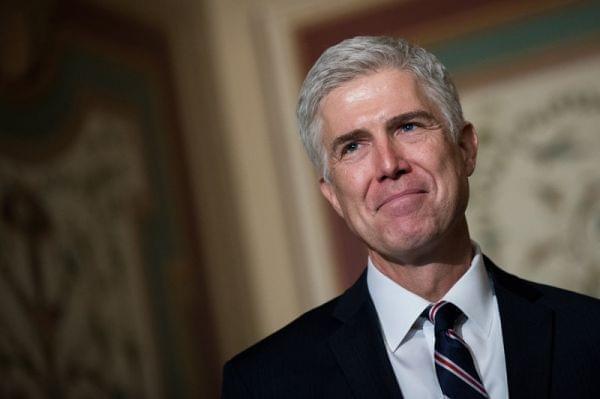Senate Confirms Gorsuch To Supreme Court

The Senate confirmed Judge Neil Gorsuch to the Supreme Court on Friday. Drew Angerer/Getty Images
Judge Neil Gorsuch was confirmed Friday as the 113th justice to serve on the nation's highest court. In a largely party-line vote, Gorsuch received the support of 54 senators.
His path to confirmation was relatively short by modern standards — just 65 days. But it was accomplished with a historic vote Thursday to end the U.S. Senate's filibuster rule for Supreme Court nominees.
Gorsuch takes the place of the late Justice Antonin Scalia, a conservative icon who died unexpectedly more than a year ago.
The new justice is also a conservative who adheres to many of the same positions that Scalia did. Indeed, some believe that Gorsuch will be more conservative.
While Scalia was enormously well-liked and admired by fellow justices, his harsh written rhetoric sometimes diminished his influence internally on the court. Gorsuch, in contrast, is known for his clear writing, but not for a harsh or dismissive writing style, and that could make him an influential justice on a court that is often closely divided on some major issues.
Though he obfuscated and evaded on many questions put to him during his confirmation hearing, all indications are that he will vote most often with the court's conservative block of justices, providing a fifth vote for a conservative majority in 5-4 cases.
The Supreme Court so far this year has punted on controversial issues, seemingly to avoid an indecisive 4-4 tie. But it has cases pending before it for next term that, if granted for review, could expand gun rights to include carrying concealed firearms in public; uphold state voting restrictions that critics contend are aimed at suppressing minority voter turnout; and allow business owners to refuse to serve gay couples, based on religious objections.
In 10 days, the justices will begin hearing their last round of arguments for this term. Among the cases to be heard is a closely watched case testing whether a Missouri church school was wrongly denied state funding for a program to make playgrounds safer. The state maintains that it cannot provide the funding without violating the constitutional requirement of separation of church and state.
Republicans change the rules
Prodded Thursday by Senate Republican leader Mitch McConnell, the Senate voted 52-48, along party lines, to trigger the so-called "nuclear option," eliminating the Senate filibuster for Supreme Court confirmations.
With a series of choreographed parliamentary maneuvers, Republicans were able, by majority vote, to abolish the longstanding rule that required 60 votes to cut off debate on a Supreme Court nomination. The victory prompted high-fives between Majority Leader Sen. Mitch McConnell and the majority whip, Sen. John Cornyn.
Senators from both parties have warned that the move will have profound consequences for the Supreme Court, predicting that more ideologically extreme judges on the right and left will be nominated to the court if only a majority is needed for confirmation. Likewise, senators have predicted that the Supreme Court will itself be injected more and more as a central issue in Senate elections, further eroding the once prized bipartisanship that made the Senate "the world's most deliberative body."
Escalating tit-for-tat in the Senate
Republicans sought to blame Democrats for the shift in the Senate's rules, noting that it was the Democrats who first abandoned the filibuster rule with a majority vote maneuver in 2013.
But Democrats replied that they were left no choice after Republicans' systematic abuse of the filibuster during the first four years of the Obama presidency, making it extraordinarily difficult to confirm lower court and executive branch nominees.
Indeed, during President Barack Obama's first term, Republicans blocked or delayed executive branch and lower court nominations 79 times. That's more than half of all the 149 filibusters used against presidential nominees in the nation's history.
The Democrats noted that even as they abolished the filibuster for executive and lower court nominations in 2013, they left it in place for Supreme Court nominations, believing that lifetime appointments to the nation's highest court are different.
Some Republicans, like Sen. Ted Cruz, maintained on Thursday that the Democrats had bowed to demands from the "radical left" in demanding that Democratic senators "obstruct everything." And indeed, liberal activists have pressed Democratic senators hard on the Gorsuch nomination, threatening some with primary opponents if they voted to allow a quick vote for Gorsuch.
But Democrats cited a variety of reasons for their votes to bar a cutoff of debate on Gorsuch. Among them: his conservative judicial philosophy as expressed in his 10 years on the bench, his evasive answers during the confirmation hearing and a burning resentment at the Republicans' unprecedented refusal for nearly a year to even hold a hearing on Obama's nomination of Judge Merrick Garland to the Supreme Court.
Thursday's vote means that from now on, all nominations, including those to the Supreme Court, can be quickly approved by a majority vote in the Senate.
The remaining question is whether Republicans will seek, by majority vote, to abolish the filibuster as it applies to legislation. On Thursday, Republican Sen. Orrin Hatch of Utah poured cold water on that idea.
"Oh no, we'll never do that," he said in response to a question. "If we do that, then the Senate will become like the House. The Senate is a place of deliberation. It's not supposed to be a place where you just move things quickly through, and the filibuster rule is a very great protection for the minority."
Democratic Sen. Tom Udall of New Mexico said there are plans afoot among a bipartisan group of senators to organize a private meeting in the Old Supreme Court Chamber, located in the Capitol, later this year.
The goal, he said, is to see if senators can figure out a way to promote more bipartisanship in a body where the two parties barely work together at all anymore.

